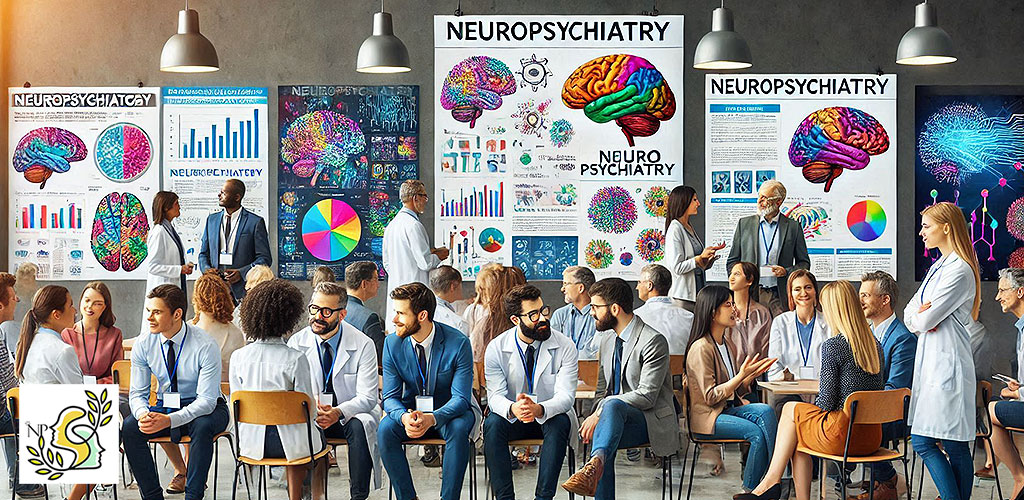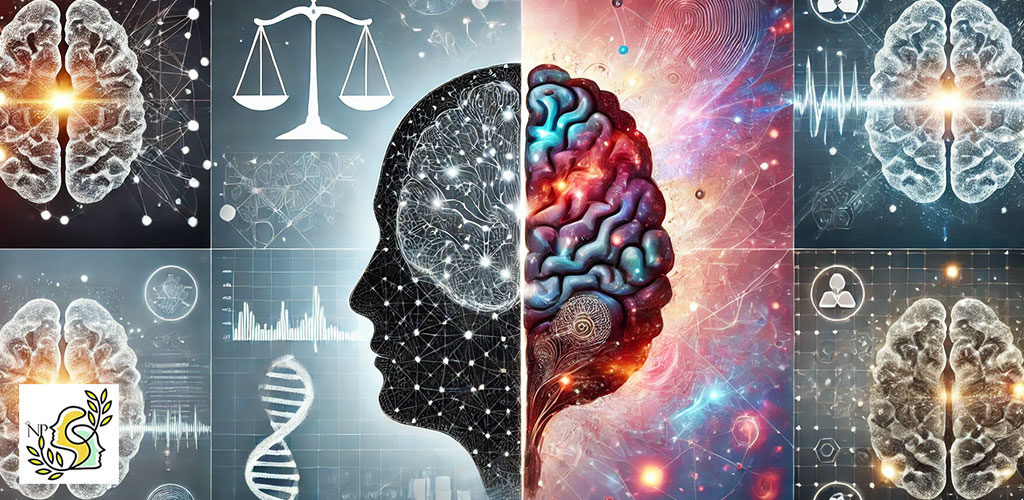Neuropsychiatry is a branch of medicine that combines aspects of neurology and psychiatry, focusing on disorders at the intersection of these two fields. These disorders, known as neuropsychiatric disorders, stem from brain dysfunctions that affect cognitive, emotional, and behavioral functions. Unlike traditional psychiatry, which primarily addresses mental health issues, neuropsychiatry aims to understand how structural and functional abnormalities in the brain contribute to psychiatric symptoms. Neuropsychiatric conditions can include mood disorders, anxiety disorders, cognitive impairments, and psychotic episodes, often linked to underlying neurological issues such as stroke, brain injury, or neurodegenerative diseases. In this article, we will explore neuropsychiatric disorders in depth, discussing key symptoms, causes, and potential treatments.
Table of Contents
What is neuropsychiatry?

Neuropsychiatry meaning the medical field that focuses on the relationship between mental disorders and neurological conditions, combines elements of both neurology and psychiatry. Neuropsychiatry is a branch of psychiatry that focuses on the study and treatment of psychiatric or behavioral disorders associated with neurological conditions. While neurology targets motor and sensory functions, psychiatry concentrates on behavior, mood, thoughts, and emotional affect. Neuropsychiatry occupies the space between these two fields, addressing issues related to perception, memory, alertness, attention, language, speech, intelligence, cognition, and motivation (including apathy). It primarily diagnoses and treats mental disorders linked to disturbances in the nervous system.
Neuropsychiatrists utilize their expertise to evaluate patients who exhibit both psychiatric and neurological symptoms, allowing for a comprehensive assessment of their conditions. This interdisciplinary approach has enhanced our understanding of the complex relationship between brain function and behavior, paving the way for new treatment options for mental illness.
In order to better understand the complex relationship between neurological and psychiatric disorders, it is essential to first define neuropsychiatry within the broader context of medical and cognitive sciences.
Neuropsychiatry vs psychiatry
Psychiatry is a branch of medical science that focuses on mental health, including the assessment and management of mental health conditions and disorders. Over time, advances in scientific knowledge have revealed that the causes of mental health disorders, as well as human thoughts and behaviors, are linked to biological processes in the brain. It is now understood that the brain functions like the hardware of a modern computer, while the mind is akin to the software it runs.
Therefore, psychiatrists are medical doctors who address the neural processes in the brain that lead to mental health abnormalities and disorders. These issues can range from chemical imbalances that cause depression and anxiety to structural damage resulting from brain injuries, infections, or metabolic changes, such as in dementia and delirium.
Neuropsychiatry is an interdisciplinary field that focuses on diagnosing, evaluating, and managing mental disorders arising from neurological conditions. This field combines the expertise of both psychiatrists and neurologists to explore the complex relationship between the brain and behavior. While both psychiatrists and neuropsychiatrists are medical doctors specializing in mental illness treatment, neuropsychiatrists receive additional training and expertise regarding the interplay between neurological and psychiatric disorders.
Neuropsychiatry vs neuropsychology
Neuropsychiatrists work with patients who have mental disorders, which often originate from brain malfunctions. Neuropsychiatry is a growing specialty that combines both neurological and psychological aspects of illness. The connection between the science learned in medical school and its practical application is very clear.
Neuropsychology, on the other hand, focuses on studying the physiological processes of the nervous system and how they relate to behavior and cognition. This includes examining both normal functions and the dysfunctional processes associated with brain damage.
While there is overlap in their fields, their treatment approaches differ. A neuropsychiatrist may primarily use a medical approach, prescribing medication to treat patients. In contrast, a neuropsychologist is more likely to adopt a rehabilitative approach.
Adult Neuropsychiatry and Pediatric Neuropsychiatry are specialized areas within this field that examine the intersection of neurology and psychiatry, with a focus on how brain function impacts behavior. Although both fields address the brain-behavior relationship, they differ significantly in their approaches, conditions, and patient populations because of variations in brain development, cognitive function, and psychiatric presentations throughout the lifespan.
Pediatric neuropsychiatry
Pediatric Neuropsychiatry offers the most current and clinically relevant information on psychiatric disorders affecting children and adolescents with brain function disturbances. This vital field bridges psychiatry and neurology, highlighting the connection between developmental brain biology and behavior.
It addresses complex conditions such as ADHD, autism spectrum disorders, Tourette syndrome, and mood disorders, where neurological and psychiatric symptoms often overlap. By integrating insights from both neurology and psychiatry, pediatric neuropsychiatry aims to provide comprehensive care, helping young patients achieve optimal mental, emotional, and cognitive development.
This multidisciplinary approach is essential for tailoring treatments to meet the unique neurodevelopmental needs of each child. Neuropsychiatric disorders frequently come with challenges related to sleep, learning, language development, motor skills, mood swings, anxiety, compulsive behaviors, and sensory processing sensitivity. Neuropsychiatric disorders in children include:
- ADHD
- Autistic spectrum disorders
- Tic disorders
Neuropsychiatric Disorders

A neuropsychiatric disorder is a complex and not fully understood condition that affects the brain’s structure, synaptic circuits, and neurotransmission. It is characterized by abnormalities in the cerebral cortex and limbic system, reduced neurogenesis, altered neural plasticity, and an increased expression of susceptibility genes. Generally, neuropsychiatric conditions do not typically lead to death. However, many fatalities can result from the use of psychoactive substances, particularly drugs and alcohol. Deaths related to drug or alcohol dependence are currently included in this category. Starting in 2006, following an update to the ICD-10, acute drug and/or alcohol intoxication has been classified as unintentional poisoning. This change in classification may result in unusual trends in death rates.
Examples of neuropsychiatric disorders include:
- Depression
- Anxiety
- Autism
- Bipolar disorder
- Schizophrenia
- seizures.
- attention deficit disorders.
- cognitive deficit disorders.
- palsies.
- uncontrolled anger.
- migraine headaches.
- addictions.
- eating disorders.
Neuropsychiatric symptoms
what are neuropsychiatric symptoms? Neuropsychiatric symptoms are a range of behavioral and psychological issues that arise from dysfunction in the brain. They are typically associated with neurological or psychiatric disorders. These symptoms can impact mood, cognition, behavior, and emotional regulation. They are commonly observed in conditions such as dementia, Parkinson’s disease, traumatic brain injuries, and stroke, as well as in psychiatric illnesses like schizophrenia, bipolar disorder, and major depression. Neuropsychiatric symptoms frequently accompany dementia and may include:
- Agitation
- Apathy
- Delusions
- Sleep impairment
- Anxiety
- Depression
- Mania
- Sensorimotor
- Dizziness/vertigo
- Sleep changes
- Objectively measured cognitive dysfunction
- Subjectively reported cognitive dysfunction
- Headache
- Reduced taste
- Reduced smell
- Speech or language difficulty
- Hallucinations
- Fatigue
- Panic
- Post-traumatic stress disorder/symptoms
- Paraesthesia, numbness or weakness of specific body parts
Neuropsychiatric Disorders causes
A neuropsychiatric disorder is characterized by significant disturbances in an individual’s cognition, emotional regulation, or behavior. These disturbances often lead to distress or impairment in key areas of functioning. Neuropsychiatric disorders fall under the broader category of mental health disorders, which includes mental disorders, psychosocial disabilities, and other mental states that cause considerable distress, functional impairment, or a risk of self-harm.
These disorders can arise from factors affecting the brain and its functioning. Genetic predispositions play a role; inherited traits can increase the likelihood of developing conditions such as schizophrenia or bipolar disorder. Environmental influences, including trauma, stress, and exposure to toxins, can also trigger the onset of these disorders. Additionally, neurochemical imbalances involving neurotransmitters like dopamine and serotonin are significant contributors. Other risk factors may include brain injuries, infections, developmental abnormalities, and lifestyle choices, such as substance abuse, which can further exacerbate symptoms. Below are some of the main causes:
- Genetic Factors
- Brain Chemistry Imbalances
- Brain Structure and Function Abnormalities
- Infections and Immune Dysfunction
- Trauma and Brain Injuries
- Substance Abuse
- Chronic Medical Conditions
- Environmental Stressors
- Aging and Cognitive Decline
- Nutritional Deficiencies
Neuropsychiatric rehabilitation
Neuropsychological rehabilitation (NR) is a framework of interventions aimed at enhancing cognitive, emotional, and psychosocial functioning following changes in the brain. These interventions include individual and group cognitive rehabilitation, psychotherapy, and psychoeducation. Additionally, psychosocial interventions address aspects of personal, physical, and social contexts. They may involve family psychotherapy, psychoeducation, and vocational training.
NR is now primarily focused on a goal-oriented approach involving collaboration with brain injury survivors, their families, and professional staff. Together, they negotiate and select achievable goals. There is a broad acknowledgment that cognition, emotion, and psychosocial functioning are interconnected, and all of these areas should be addressed in rehabilitation. This forms the foundation of a holistic approach. Additionally, technology is increasingly utilized to help compensate for cognitive deficits and various technological aids are discussed.
A neurological rehabilitation program is tailored to address your individual needs based on your specific condition or disease. Active participation from both you and your family is essential for the program’s success. The primary aim of neurological rehabilitation is to help you achieve the highest possible level of function and independence. Additionally, the program seeks to enhance your overall quality of life—physically, emotionally, and socially. To help reach these goals, the program may include:
- Support with activities of daily living, including eating, dressing, bathing, using the bathroom, handwriting, cooking, and basic housekeeping.
- Speech therapy to assist with speaking, reading, writing, or swallowing.
- Management of stress, anxiety, and depression.
- Bladder and bowel retraining.
- Exercises and activities designed to enhance movement, muscle control, walking, and balance.
- Exercise programs aimed at improving mobility, preventing or reducing weakness due to inactivity, managing muscle spasms and pain, and maintaining range of motion.
- Retraining in social and behavioral skills.
- Nutritional counseling.
- Participation in community support groups.
- Activities focused on improving concentration, attention, memory, and decision-making skills.
- Assistance with obtaining and using adaptive devices to promote independence.
- Education and counseling services.
- Safety and independence measures, as well as home care needs.
- Pain management strategies.
- Vocational counseling.
Conclusion
In conclusion, neuropsychiatry focuses on the intersection of neurology and psychiatry, aiming to understand and treat disorders that involve both brain function and mental health. Neuropsychiatric disorders can present a wide range of symptoms, from cognitive impairments to emotional and behavioral changes. Their causes often include complex interactions between genetic, neurological, and environmental factors. By addressing both the brain’s physical and psychological aspects, neuropsychiatry plays a crucial role in the diagnosis and treatment of these conditions, offering a more comprehensive approach to patient care.
Frequently Asked Questions
Frequently Asked Questions about neuropsychiatry, Neuropsychiatric Disorders Symptoms, Causes.
what is the most prevalent neuropsychiatric symptom?
Neuropsychiatric symptoms are a common accompaniment of dementia. These include agitation, depression, apathy, delusions, hallucinations, and sleep impairment.
Is anxiety a neuropsychiatric symptom?
Examples of neuropsychiatric disorders include depression, anxiety, autism, bipolar disorder, and schizophrenia.
What is the difference between psychiatry and neuropsychiatry?
While both psychiatrists and neuropsychiatrists are medical doctors who specialize in the treatment of mental illness, neuropsychiatrists have additional training and expertise in the relationship between neurological and psychiatric disorders.
What is the difference between neuropsychology and neuropsychiatry?
Where they differ slightly is the approach they take in treating patients and addressing their issues. Whereas a neuropsychiatrist may adopt a purely medical approach to treating a patient by giving the relevant prescription, a neuropsychologist may instead adopt a more rehabilitative approach to their patients.
References:
https://pubmed.ncbi.nlm.nih.gov/29037336
https://pubmed.ncbi.nlm.nih.gov/32439018
https://pubmed.ncbi.nlm.nih.gov/27322689
https://pubmed.ncbi.nlm.nih.gov/32439030
https://pubmed.ncbi.nlm.nih.gov/35675819
https://pubmed.ncbi.nlm.nih.gov/34906722
https://pubmed.ncbi.nlm.nih.gov/29246661
https://pubmed.ncbi.nlm.nih.gov/38379196
https://pubmed.ncbi.nlm.nih.gov/30476505
https://pubmed.ncbi.nlm.nih.gov/29789033
https://pubmed.ncbi.nlm.nih.gov/26386541
https://pubmed.ncbi.nlm.nih.gov/31753148
https://pubmed.ncbi.nlm.nih.gov/37458987
https://pubmed.ncbi.nlm.nih.gov/19854819


